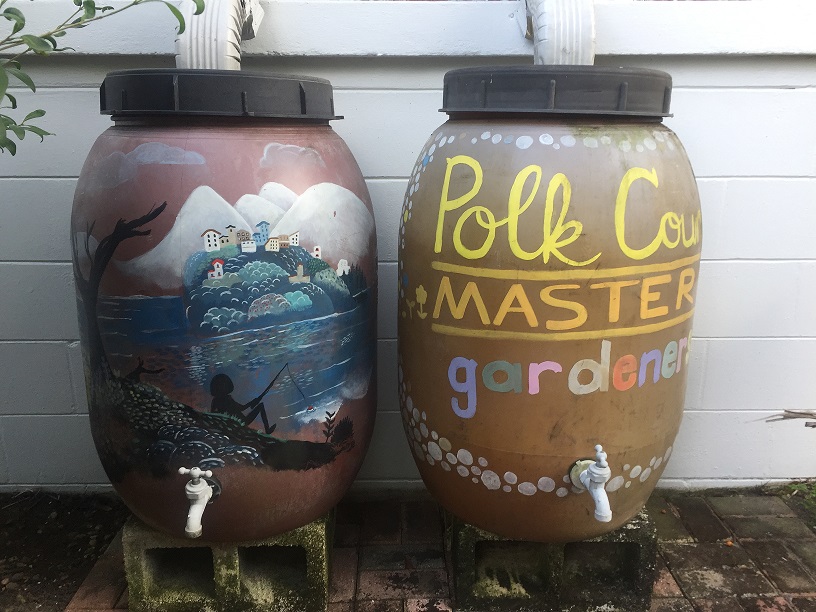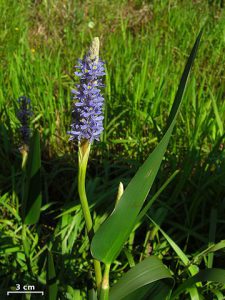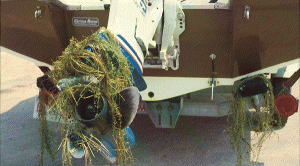Earth Day, held annually on April 22nd, creates a surge of interest in living “green” or in an environmentally friendly way. Below, I’ve shared some Earth Day celebration suggestions which help our local environment in the long-term.
Stormwater Management for Residents

Consider installing a rain barrel or a rain garden to help reduce pollution flowing into our lakes, rivers, and estuaries.
A rain barrel collects rain which lands on your roof. Alternatively, rain gardens do the same thing but can also provide attractive landscaping with native flowering plants which are tolerant of both flooding and drought.
Rain barrels and rain gardens reduce stormwater runoff; or in other words, water which flows over our roofs, sidewalks, driveways, and other paved surfaces into storm drains.
This “stormwater” flows directly into our lakes once it enters a stormwater drain, carrying with it pollution like brake dust and oil from cars, dead leaves and grass clippings, and pollution from roofs.
By “gardening” that water on your property, you can significantly reduce the amount of pollution entering our lakes, every time it rains! To learn more about rain gardens and how to install them, read this guide: Rain Garden Manual for Central Florida Residents.
Lakefront Landscaping

By Jason Hollinger – Pickerelweed, CC BY 2.0
If you live on a lakefront, consider removing invasive exotic plants and replacing them with Florida native aquatic plants.
Attractive lakefront plants, like purple-flowered pikerelweed or white-flowered lanceleaf arrowhead, can create an Earth Day double-whammy by helping the environment and improving the look of your waterfront.
When you plant Florida native aquatic plants, you create high-quality wildlife habitat and a natural filter for stormwater pollution. Additionally, native aquatic plants are easier to maintain on your waterfront. Remember, if you are planting ANY aquatic plants on your Florida waterfront you can only plant Florida native aquatic plants (it’s the law).
To learn more about invasive aquatic plants or lakefront landscaping, contact your local UF/IFAS Extension office.
Prevent the Spread of Aquatic Invasive Species
If you own a boat, it’s important to know that you play a vital role in protecting our lakes. Boat trailers and bilges can spread exotic aquatic plants to new waterbodies.

In celebration of Earth Day, add a step to you boat trailering process. Check your boat and trailer for any aquatic plant material and remove it before leaving the boat ramp.
Several exotic aquatic species can regrow from even tiny fragments of plant material.
By removing these pieces of vegetation from your trailer wheels, propeller, and other “catch points” on your vessel, you play an important role in preventing the spread of invasive exotic aquatic plants.
In Conclusion
All four of these Earth Day celebration suggestions create ongoing benefit for our local environment and wildlife:
- removing invasive plants and replacing them with native plants on your lakefront
- check your boat and boat trailer for aquatic plant material and removing it before leaving the boat ramp
- installing a rain garden in your yard
- installing a rain barrel for your home
You can make a difference this Earth Day by celebrating in a way that creates long-term impact.
Stormwater pollution is the leading cause of declining water quality in most Central Florida lakes, rivers, and springs. Invasive species are an issue on land and in the water; help prevent the spread by removing them from your yard and from your boat and trailer. Healthy native aquatic plant communities lead to healthy lake ecosystems and improved wildlife habitat.
To learn more about implementing these Earth Day celebration suggestions, contact your local UF/IFAS Extension office. We’re here to help!
 0
0
